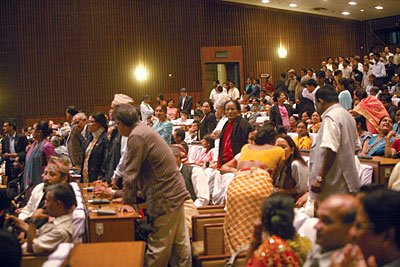 |
Observing the continuing political drama, which is as exciting as watching paint dry, there are those who say that we deserve the politicians we get. Perhaps. But what if we say that we only get the politicians who can thrive in the system we've let mutate to its present form? More than what's in our fate, it's the system that we have tolerated for far too long that gives us the politicians we are stuck with.
There are two system-level observations one can make. The first one is a primary problem. The second is a by-product of the first.
Unresponsive representation: Take a public health disaster. In the last 10 days, more than 30 Nepalis have died due to cholera and diarrhoea outbreaks in the western parts of Nepal. Though deadly when untreated, cholera and diarrhoea are both easily preventable diseases.
Putting aside the concern of whether there are enough healthcare workers and medicines in the remote parts of Banke or Surkhet, what's surprising is how little political representation the victims get in today's democracy. Of the assembled 601, not a single CA member, including those from the affected districts, stands up and says, "These needless, untimely deaths of fellow Nepalis are unacceptable. They have to be stopped. When our citizens continue to die en masse because of preventable diseases, it indicates that something is horribly wrong. When we can't even fix this simple problem, how will we achieve our goals in education, health, livelihood, and so on for a better Nepal?"
The reason not a single CA member says that is simple. They may wax eloquent about Democracy, but they have zero incentive to practice democracy, in this case, by lending political urgency to solve people's problems. Most came to the CA because they listened to their party bosses who wanted to strengthen their numbers, not because they listened to voters. As such, even when they do nothing for the districts that they represent, there is little they need fear: so long as their party has the money and is powerful, it will give them the permission to stand for election again, and win. Voters thus become a means to political ends
Over the years, what this practice has amounted to is this. Yes, we have democracy and yes, we have elections, but the system is designed to be unresponsive to people's concerns.
Not my children's future: People work hard to improve, if not their own future, then their children's future. Human nature being what it is, it's hard for most people to get excited about the future of other people's children.
But politicians searching for appealing generalities often make references to improving our children's future as a way to anchor their present actions to possible future gains. In Nepal, politicians know that, given half a chance, most young people would rather leave the country. It's likely that most politicians' children are not in the country themselves.
Shorn of an honest metaphor that refers to our shared collective future, Nepali politicians habitually lapse into speeches that are filled with abstractions about Democracy and revolutions. When one can't imagine, much less communicate, what the future holds in more vivid, concrete terms, then the question becomes: is one really working for long-term goals or for quick short-term gains � the answer to which is plain to all who follow politics.
The content of national politics can be dispiriting. Instead of asking politicians to behave themselves, finding ways to change the context of politics is how changes are likely to come faster.
READ ALSO:
Hard choices, PRASHANT JHA
Tail between our legs, PUBLISHER'S NOTE
Nay to the government, INDU NEPAL
Following the paper trail, CK LAL



